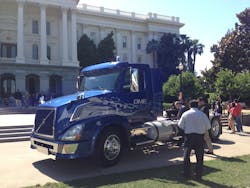Volvo adds DME to alternative fuel options in North America
Sacramento, CA. Volvo Trucks says it will begin limited production of Volvo VNL trucks powered by the alternative fuel dimethyl ether (DME) in 2015.
In a related development, Safeway Inc. will begin field testing two VNLs with Volvo D13 engines modified to use the new fuel option under a $500,000 grant from California’s San Joaquin Valley Air Pollution Control District, the truck maker said today at a press conference in the state’s capitol.
DME can be produced from a variety of biomass waste materials or natural gas, offering CO2 reductions of up to 95% compared to diesel. Modifications to the D13 are relatively minor and will not require the use of diesel particulate filters (DPFs), according to Volvo. Handling and storage is similar to propane and does not require cryogenic or high-pressure storage, the company said.
“We decided to test Volvo DME technology in our fleet because it is a natural fit with our sustainability strategy,” said Tom Nartker, vp of transportation at Safeway.
“With the addition of DME-powered vehicles to our previously announced CNG and LNG offering, Volvo’s Blue Power line-up will offer the industry’s most comprehensive approach to the developing North American alternative fuel market,” said Göran Nyberg, president of Volvo Trucks North American sales and marketing.
As part of the California field test, Oberon Fuels will begin commercial production of DME in the Imperial Valley using new skid-mounted, small-scale units.
“Our small-scale process enables the utilization of regional feedstocks to produce DME,” said Rebecca Boudreaux, Ph.D., president of Oberon Fuels. “Cost-effective, regional fuel production addresses the distribution issue, and offers the potential to bypass the need for a national fueling infrastructure, while reducing the carbon footprint associated with transporting the feedstock and the fuel produced.”
Earlier this year Volvo began field testing its first DME-powered VNL in the U.S. with a bulk hauler. Calling the test “highly successful,” Nyberg said customer feedback and early test results led to its decision to begin commercial production of DME-fueled heavy trucks for the North American market.
In addition to the CO2 reduction and handling benefits, DME is similar to diesel in performance and efficiency, according to Volvo. Unlike natural gas, it is a compression ignition fuel that does not require spark or diesel-pilot injection, and it has enough storage density to be suitable for long-haul applications or trucks carrying vocational bodies. It is also non-toxic and is already widely used as an aerosol propellant in cosmetics and other household products, the company pointed out during the press announcement.
The DME fuel systems could eventually be installed on the D13 engines at the company’s Hagerstown, MD, powertrain plant, but initial low volumes will be handled outside of Hagerstown, according to the company. Volvo already offers CNG-powered VNL and VNM day cab models in North America and has previously announced that it will introduce a proprietary LNG heavy-duty engine in VNL day-cab and sleeper models next year.
About the Author
Jim Mele
Jim Mele is a former longtime editor-in-chief of FleetOwner. He joined the magazine in 1986 and served as chief editor from 1999 to 2017.
